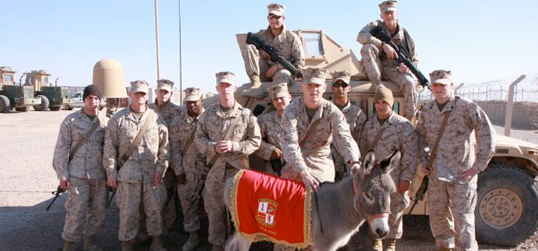U.S. Marine Colonel John Folsom, the top-ranking officer at Camp Al-Taqaddum near Falujah, Iraq, was accustomed to waking up to the sound of helicopter rotors. But on this particular Sunday morning in May 2008, he was awakened by an unusual sound, “hee-haw, hee-haw, hee-haw.”
Folsom slipped on his pants and ambled outside his barrack to discover a scrawny, grayish-brown, three-foot donkey tied with a rope to a eucalyptus tree. Although Folsom had joked with his sergeant that the next time he saw one of the wild donkeys that roamed the base to catch it, he never thought he would be taken seriously.
A man who could go along with a joke, Folsom made his Monday morning rounds escorted by a donkey on a rope. By lunch, everyone on base had heard about the colonel’s donkey. A few days later, when the donkey snatched a lit cigarette from a marine’s fingers and ate it, the marines christened him Smoke.
Within a few weeks Smoke was the star of the base and a big morale booster. Smoke learned to open office doors and steal candy off desks, service men wrote home to their children about him, and someone created a Facebook page for the unusual pet. Because pets were prohibited in combat zones, Colonel Folsom persuaded a Navy physician to write a permission letter declaring Smoke a therapy animal.
Smoke got fan mail, had his own camouflage shirt, and a personalized blanket. Everyone on base loved Smoke. In 2009, when their tour of duty was up and Folsom’s logistics group was returning to the States, the unit that replaced them promised to take good care of Smoke.
A year later, as Colonel Folsom prepared to retire from the Marine Corps Reserve, he was going though old pictures when he came across Smoke. Curious, he phoned the major who replaced him to inquire about the donkey. He discovered that the logistics group had been unable to find anyone to take Smoke and had given him to a local Iraqi sheik.
Folsom knew of the fate of most donkeys in Iraq – no longer used for farming, most were abandoned to run wild or were killed. Reminded of the Marine Corps tradition of No Marine Left Behind, Folsom decided to bring Smoke home.
It took weeks and the U.S. State Department’s involvement to finally track the sheik down. After some haggling he agreed Folsom could have the donkey on two conditions – Folsom would have to find someone in Iraq to round up the donkey and he would have to the make arrangements to ship the donkey to his house near Omaha, Nebraska.
After some checking, Folsom discovered that Operation Baghdad Pups, a program sponsored by the International Society for the Prevention of Cruelty to Animals (ISPCA), had a program for helping reunite dogs and cats with military personnel. Although the ISPCA had no experience with livestock, Folsom convinced them to give it a try. In mid-January 2011, Smoke was rounded up and shipped to Irbil, in northern Iraq.
The ISPCA spent weeks trying to come up with an acceptable shipping route before getting approval to ship Smoke through Istanbul, Turkey, to Germany, and on to New York. On April 5, 2011, Smoke was ready to begin his journey when Folsom was informed that Turkey had not allowed entrance to Iraqi animals since 2003.
After more weeks of negotiations with the U.S. Embassy staff in Ankara, Turkey, Folsom received approval for the trip. Smoke arrived in Istanbul on April 19 and was immediately involved in transit issues to Germany. At this point a frustrated Folsom, exhibiting the stubbornness of a donkey, flew to Istanbul, all the while wondering why he ever considered bringing a donkey home.
Folsom made multiple calls to German officials explaining that Smoke had been a Marine therapy animal and that he planned to use him in the same capacity when he got to Nebraska. His pleas fell on deaf ears until he mentioned that Smoke had his own Facebook page. The German official responded, “He does?” After checking out the Facebook page, the German government contacted a Frankfurt veterinarian who was equally impressed that the burro was on social media and Smoke was cleared to travel.
Smoke finally landed in New York City on May 12, 2011, five months after leaving Fallujah, Iraq, and was shipped to an animal import center 60 miles north of the City. Folsom traveled from Nebraska to New York to welcome the burro. When Folsom saw the donkey, he wasn’t sure it was the same animal, but when the donkey caught sight of Folsom, his eyes brightened and he greeted him with “hee-haw, hee-haw, hee-haw – hello, old friend.” Folsom responded, “Welcome home, Smoke,” and the little donkey leaned in to him.
Smoke lived at Take Flight Farms near Omaha and served in Wounded Warriors Family Support, a non-profit which Folsom created. The donkey’s role was helping improve the morale of children whose parents had been wounded in military combat. He once again had his on Facebook page, marched in a Memorial Day parade, and served faithfully before dying of cancer in August 2012. John Folsom continues the work of helping families of wounded veterans and on the shelf above his desk is an urn containing the ashes of Smoke, his old Iraqi war buddy.
“When you start a thing, don’t quit until you finish it.” Henry Ford
